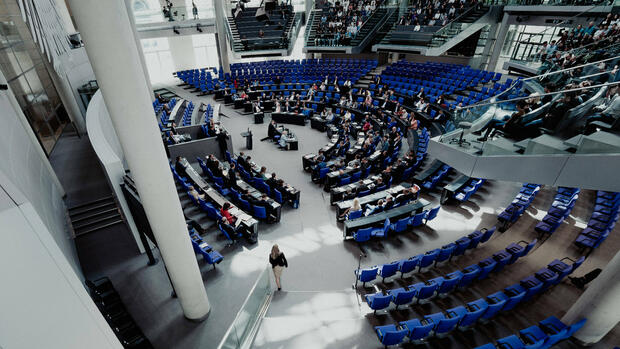Berlin Actually, a long hanging game should have ended this Friday. According to the plan of the traffic light coalition, the members of the Bundestag should decide on the reform of the Building Energy Act (GEG).
The CDU parliamentarian Thomas Heilmann saw his rights as a member of parliament violated and applied for a temporary injunction a week ago. Heilmann had criticized that Parliament did not have enough time to discuss the project. The Karlsruhe court granted the application late Wednesday evening.
What is a bitter damper for the coalition partners SPD, Greens and FDP, who were obviously not prepared for this and initially reacted with speechlessness – while Heilmann and the Union celebrated the decision of the Karlsruhe judges.
Nadine Schön, deputy chairwoman of the Union parliamentary group, said immediately after the announcement: “The building energy law must be conscientiously revised and improved.” The traffic light wanted to enforce the law “with the battering ram”. That would have been a fatal sign, as there are still many unanswered questions.
The announced funding programs are neither coordinated nor financed. The law on municipal heating planning is not available. During her time in the Bundestag, she had “never experienced such a hasty process”.
Heating law stopped: SPD is considering a special session
Timon Gremmels, rapporteur for the SPD parliamentary group, said on Twitter: “The decision of the BVerfG must be noted with respect”. The court “didn’t criticize the final law, just the procedure,” Gremmels continued. Everyone needs planning security. “Therefore, we should examine the special session of the Bundestag during the summer break.” Greens parliamentary group leader Britta Haßelmann made a similar statement.
From Heilmann’s point of view, that would not have been enough. “A special session is not enough,” he said on Thursday morning. Heilmann advised the traffic light coalition to also hear experts again and to let the responsible Bundestag committee meet. Otherwise, the coalition runs the risk that the law will later be declared unconstitutional for formal reasons.
Green parliamentary group leader Katharina Dröge spoke on Twitter of “respect for the decision” of the court. “We will quickly decide on the new date for the final consultation at the traffic light.”
Constitutional lawyer: “The coalition should look into itself”
FDP parliamentary group leader Christian Dürr evaluated the provisional stop of the heating law by the Karlsruhe judges as evidence of the need for extensive changes to the GEG reform. “In view of the extraordinarily extensive changes, Karlsruhe considers it possible that MPs’ rights would be violated if the law were passed this week,” Dürr said in Berlin early Thursday morning. “The decision therefore underlines that the Building Energy Act has been turned upside down.”
The Second Senate of the Constitutional Court still has to decide on the main issue.
(Photo: dpa)
The Berlin constitutional lawyer Christian Pestalozza interpreted the Karlsruhe decision as a reminder to the traffic light coalition: “The government majority should look into itself and not let Parliament suffer from its internal quarrels,” the university lecturer told the Handelsblatt. However, Pestalozza emphasized that it is “completely open” as to how the main decision will turn out.
Heating law: FDP had pushed for changes
Within the traffic light government, the FDP in particular had pushed for changes to the original draft law. The cabinet had already approved the draft law from the Economics Ministry by Robert Habeck (Greens) and the Building Ministry by Klara Geywitz (SPD) in April. But even then, Finance Minister Christian Lindner (FDP) put it on record that the parliamentary groups in the Bundestag would discuss the draft law intensively in the parliamentary process and make further changes.
That was a rather unusual procedure: After all, it is perfectly normal for bills to be changed in the parliamentary process before the Bundestag passes them.
It was also difficult to introduce the draft law into the Bundestag. Only when the coalition factions had agreed on June 13 about so-called “guide rails” for the draft did the FDP agree to the deliberations in parliament. On June 15, the ultimately outdated draft law was discussed in the Bundestag in the first reading and referred to the Committee for Climate Protection and Energy.
This heard experts on June 21 and scheduled a special meeting for June 27. The amendments to the law have only been available since last Friday. As a result, before the second hearing on Monday this week, the experts only had the weekend to review the papers and prepare for the hearing.
More: Constitutional Court halts passage of controversial heating law
First publication: 07/06/2023, 08:58 a.m. (last updated: 07/06/2023, 09:30 a.m.).
